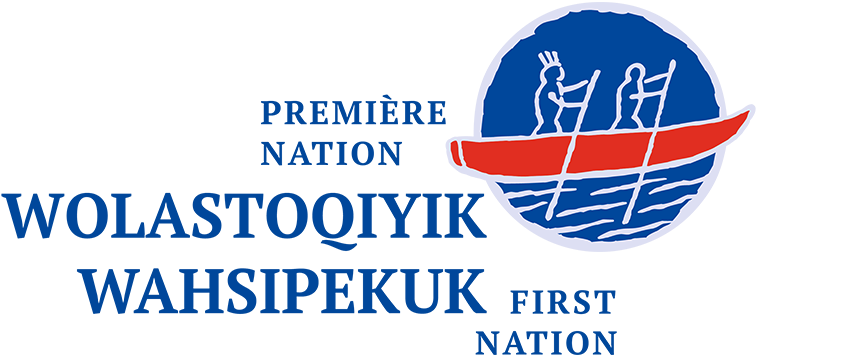

Home / Lessons / Level 1 / 4. Where I Come From, Where I Live
In this lesson, you will learn how to ask someone where they come from and where they live, as well as how to respond to these same questions if they are asked to you. You will also learn how to use prefixes to qualify certain things as good or bad, and you will put these notions into practice with dialogues related to outdoor temperature.
Question : Tama kil ‘kuceyaw ?  / Where are you from? (origin)
/ Where are you from? (origin)
Answer: Nuceyaw nil Kepek.  / I am from Québec.
/ I am from Québec.
Tama  |
Where |
Kil  |
You (informal) |
‘Kuceyaw  |
You come, your origin |
Nuceyaw  |
I come from, my origin |
Nil  |
Me, I |
Kepek  |
Québec |
Question : Tama kil kwik ?  / Where do you live?
/ Where do you live?
Answer: Nwik nil Rimouski.  / I live in Rimouski.
/ I live in Rimouski.
Tama  |
Where |
Kil  |
You |
Kwik  |
Live (residence) |
Nwik  |
Live (residence) |
Nil  |
Me, I |
Rimouski  |
Rimouski |
The prefixes «Woli» and «Moci» (moc-) are used to qualify things as «beautiful, good, well» and «bad, not good» respectively.
| Woli / good | Moci / bad | English | Animate (A) or Inanimate (I) |
|---|---|---|---|
Wolinaqsu  |
Mocinaqsu  |
It’s beautiful / It’s ugly | (A) |
Wolimahte  |
Mocimahte  |
It smells good / It smells bad | (I) |
Question : Tan olokiskot pemkiskahk ?  / What’s the weather like today?
/ What’s the weather like today?
Answer: Wolokiskot yut pemkiskahk.  / It’s nice here today.
/ It’s nice here today.
Mocokiskot yut pemkiskahk.  / It’s not nice here today.
/ It’s not nice here today.
Tan  |
How |
Olokiskot  |
(kisq = day) Outdoor temperature |
Pemkiskahk  |
Today |
Wolokiskot/mocokiskot  |
It’s nice / It’s not nice |
Yut  |
Here |
Pemkiskahk  |
Today |
| Vocabulary | English | Animate (A) or Inanimate (I) |
|---|---|---|
Wolinaqsu  |
Looks good | (A) |
Wolihtaqot  |
Sounds good | (A) |
Wolinaqot  |
Looks good | (A) |
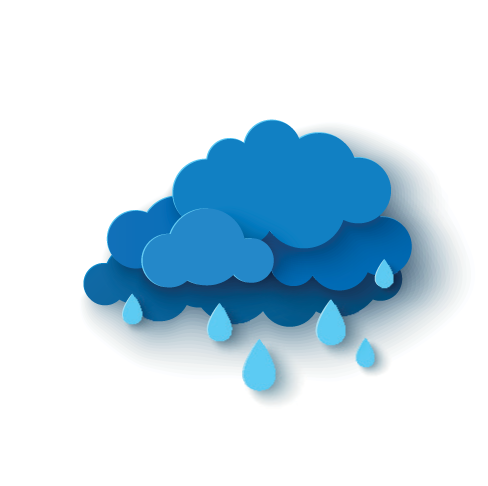 Komiwon  Rain / It’s raining |
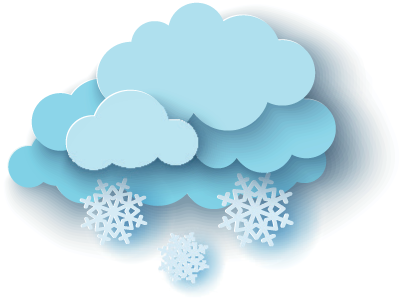 Wast  snow Psan  it’s snowing |
 Lamoqessu  Heavy snow Storm / There is a storm |
|||
 Wocawson  wind Tollamson  wind / it’s windy |
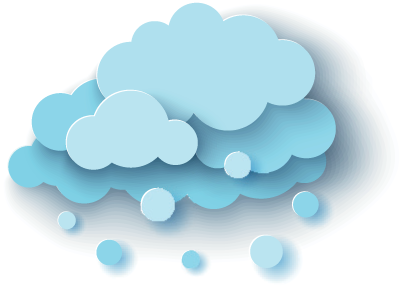 Pqomis  hail Pqomisiye  hailing |
||||
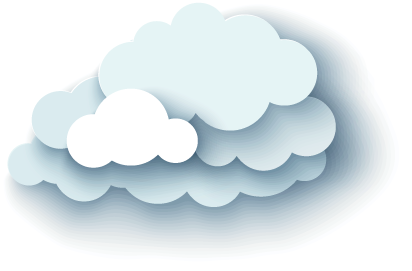 Aluhk  cloud Aluhkot  cloudy |
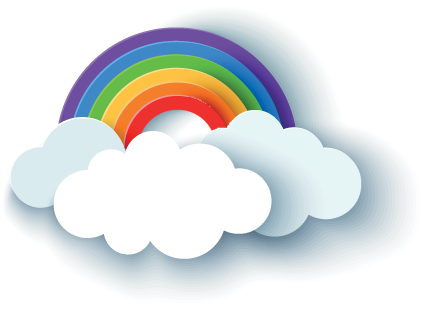 Monoqan  Rainbow |
 Kisuhsuwiw  It’s sunny Kisuhs  sun |
|||
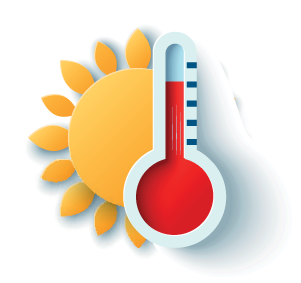 Ksate  It’s a hot day |
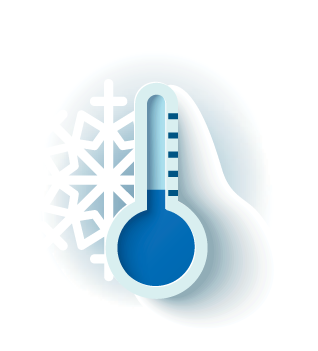 Tkeyu  It’s cold |
||||
Translate the following questions in Wolastoqey, then suggest a response (in Wolastoqey, naturally!).
| Questions | Answers | ||
|---|---|---|---|
| 1. | How are you? ? |
! |
✓ |
| 2. | What is your name? ? |
[your name]. |
✓ |
| 3. | Where are you from? ? |
[the place you come from]. |
✓ |
| 4. | Where do you live? ? |
[the place where you live]. |
✓ |
| 5. | Are you from Wahsipekuk? ? |
,
. , [another place]. |
✓ |
| 6. | Do you live in Tobique? ? |
,
,
. , [another place]. |
✓ |
| 7. | What’s the weather like? ? |
. . |
✓ |
| 8. | What’s the weather like today? ? |
. . |
✓ |
| 9. | What’s the weather like here? ? |
. . |
✓ |
Translate into Wolastoqey this message that Peter sent you to introduce himself.

Can you read this letter from Caroline? Translate it in English.
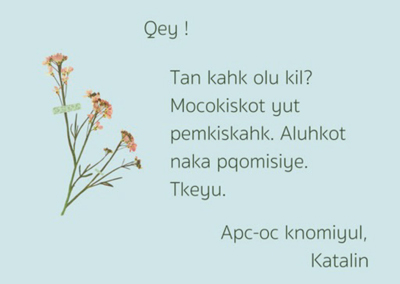
Answer the following questions in Wolastoqey. Note: You may need to start your response with “yes” or “no”.
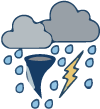 |
Mocokiskot yut ? |
 |
Mocokiskot yut ? |
 |
Tan olokiskot pemkiskahk ? |
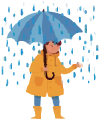 |
Tan olokiskot yut ? |
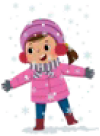 |
Tan olokiskot pemkiskahk ? |
 |
Tan olokiskot yut pemkiskahk ? |
Find the Wolastoqey words that correspond to each of the elements on the list.
How it works: Click on the first letter of the word, then on the last to validate a word.
Words can overlap and go in these directions: → ↘ ↓.
Fill in the table with the Wolastoqey equivalents to the English prompts.
Additional information for exercises solutions may appear in the Appendix of the PDF document.